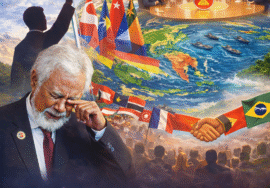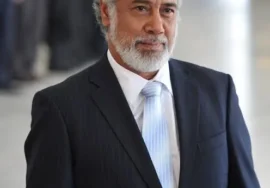
BJ Habibie and Technological Independence: From a Small Workshop to the World
Editorial Note
GerakanMandiri.com believes that true independence does not come from elite circles, but from the courage of the people—and national figures—to stand on their own feet. The story of BJ Habibie is living proof: from a small workshop in Parepare to the global stage of aviation technology. He taught us that a great nation cannot remain dependent—it must dare to create.
From Parepare to the World
Bacharuddin Jusuf Habibie was born in Parepare, South Sulawesi, in 1936. From a young age, he was known for his diligence, thirst for knowledge, and insatiable curiosity. After studying engineering at ITB, Habibie continued his education in West Germany. There, he proved himself not only as a student, but as an innovator.
Habibie developed the groundbreaking crack progression theory, a major contribution to aircraft construction technology. His work drew the attention of the global aviation industry to a young engineer from Indonesia. From a modest laboratory and tireless dedication, Habibie rose to a key position at Germany’s aircraft manufacturer MBB (Messerschmitt-Bölkow-Blohm).
Returning Home for Indonesia
Despite a brilliant career abroad, Habibie chose to return home in the 1970s. He answered President Soeharto’s call to build Indonesia’s technological independence.
Habibie led the establishment of PT Industri Pesawat Terbang Nurtanio (IPTN), the forerunner of today’s PT Dirgantara Indonesia (PT DI). Under his leadership, ambitious projects took shape, including the N-250 “Gatotkaca”, which successfully had its maiden flight in 1995.
For Habibie, technology was not merely a tool, but a symbol of national dignity. “Indonesia must stand equal with other nations,” he declared.
Technological Independence as a Pillar of the Nation
Habibie often emphasized that a great nation is not defined by its abundance of natural resources, but by its mastery of science and technology. In his view, dependence on other countries would only weaken sovereignty.
Through his vision of “technological self-reliance”, Habibie instilled the spirit that Indonesia should not forever remain a market for foreign products. The nation’s youth must dare to create, innovate, and lead change.
An Inspiration for Gerakan Mandiri
Habibie’s story is deeply aligned with the spirit of GerakanMandiri.com: true change grows from the ground up, from the courage to take initiative—not from waiting for instructions. Habibie began in a small workshop, armed with discipline, perseverance, and conviction.
Today, whether we talk about renewable energy, food sovereignty, or digital innovation, Habibie’s spirit remains relevant. Independence is not an empty dream—it is a choice worth fighting for.
The Great Dream of the Nation
Habibie left behind a profound legacy: not just aircraft and scientific theories, but the conviction that Indonesia can stand on the world stage with its own creations. From a small workshop in Parepare to the command rooms of aviation industry, his life is an invitation to us all—to dare to dream, to work, and to build independence.
For in truth, a sovereign nation is one that stands upon its own works.
References
Kompas.com – Habibie, A World-Class Scientist from Parepare
Tempo.co – Habibie’s Technological Legacy and the N-250
CNN Indonesia – Habibie’s Legacy for Indonesian Technology
Historia.id – Habibie: From Germany for Indonesia








